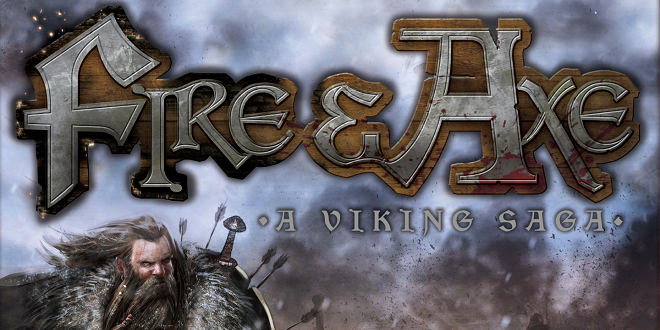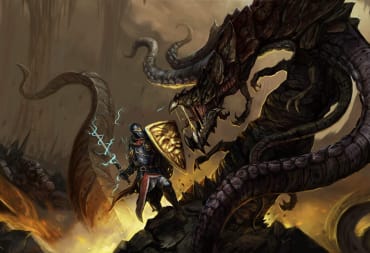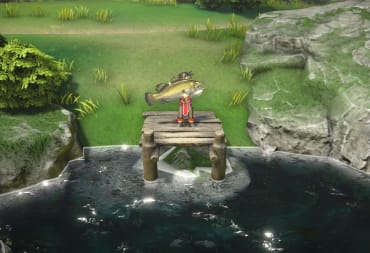My first impression of Fire & Axe was that it was essentially Merchants and Marauders with a Viking theme. This wasn't a bad thing, as Merchants and Marauders is one of my favorite board games, but it left me wondering if I wouldn't end up rather playing Merchants and Marauders when the mood to play a nautical adventure game strikes. While it doesn't quite reach the lofty heights for me that Merchants and Marauders does, it comes pretty close, and it turns out that Fire & Axe is different enough, and fun enough, to stand on its own and earn a permanent spot in my board game collection.
Fire & Axe places each player in control of their own clan of Vikings, and tasks them with setting out into the world in order to Trade, Raid, and Settle their way to the most glory. Each of these individual actions will net the players points, but the most lucrative actions are the ones that complete tasks laid out by the various Saga cards. There are always three Sagas available, with each particular Saga card going to the player who completes the final step of the task listed on the card. This forms the core of the inter-player tension as most Saga cards require multiple actions to be fully completed. The actions can be completed in any order, but, since only the player who completes the final action gets the credit, players will constantly be trying to outwit, outmaneuver, and interfere with their opponents in order to grab that final action.
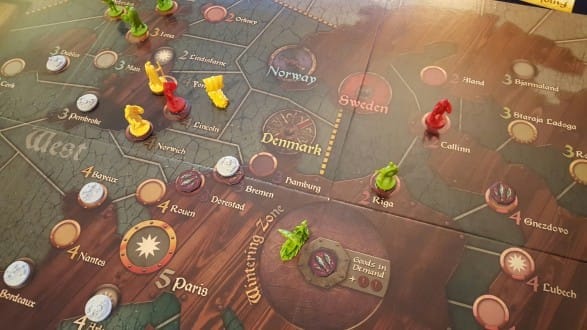
The Saga deck also acts as the game's timer, giving players even more incentive to grab as many Sagas as quickly as they can. As soon as the final Saga from the deck is placed on the table, players will only have 3 turns left before the game ends and final scoring begins. The Saga-deck-as-timer mechanic is a fun system as it keeps inter-player tension high and also allows the game length to be easily adjusted based on player preference or on time available.
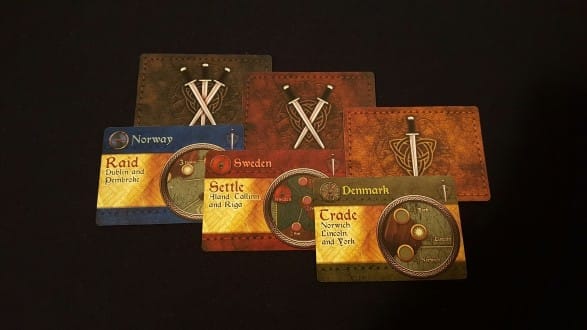
Players also have a shared deck of Rune cards at their disposal. The Rune cards have a wide variety of effects, from those directly beneficial to the player who plays the card, to cards that are essentially direct attacks on their opponents. There are some really nasty cards in the Rune deck, and some players may wish to take the nastiest of them out, as they can really have a negative effect, especially when a few are played against one player in rapid succession, or when a few players gang up on another player.
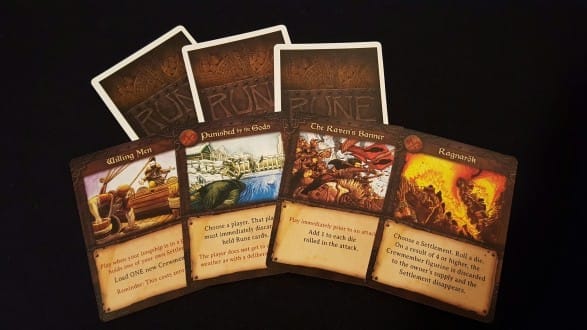
Even when the Rune cards that have a negative effect aren't used, they still have a profound effect on gameplay. This is because the Wind can be changed each time a player plays or discards a Rune card. The Wind directly determines how many days each player can safely sail in an ocean region before they begin to take losses due to rough winds and high seas. Smart players can make use of The Wind to directly benefit themselves while hindering their opponents' movement around the board.
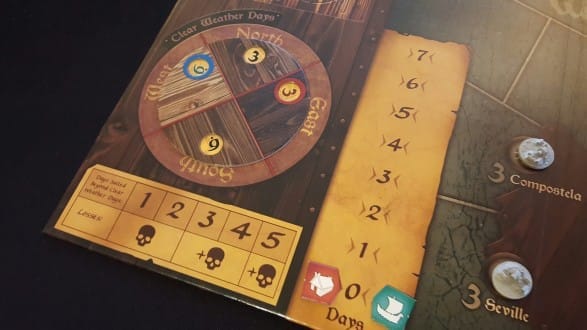
It pays to be efficient in Fire & Axe, as each player's Longship can only hold so many goods and Vikings, yet loading a ship up to capacity takes time that could be spent delivering goods, raiding towns, and claiming new settlements. It's smart to try to formulate and execute a plan, but also very difficult to hide your intentions from your opponents, as it can be pretty obvious what you intend to do based on what you've loaded in your ship and which direction you are headed. This works very well in Fire & Axe because it further encourages players to interfere with one another and compete to complete the most lucrative goals.
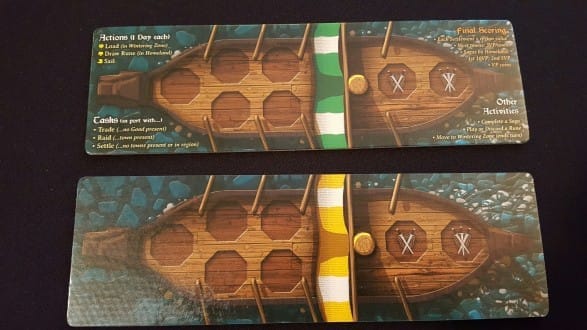
A note on player count: Fire & Axe is designed for 3 - 5 players. I tried playing it with 2 players, simply by removing a few extra Saga cards during set up, and it worked wonderfully. The game doesn't quite have the tension with 2 that it has with higher player counts, but it is still a satisfying and fun experience.
A note on play time: Fire & Axe can be a lengthy game, with play time increasing directly proportionally to player count. Fortunately, since the Saga cards act as a game timer, the play time can be easily pared down simply by lowering the number of Saga cards that are used. This is a great option for players who either don't want the game to last too long or don't have enough time to play a full game. The opposite is also true. For players who really want to play a lengthy, epic-feeling game of Fire & Axe, they can simply add more Saga cards to the deck.
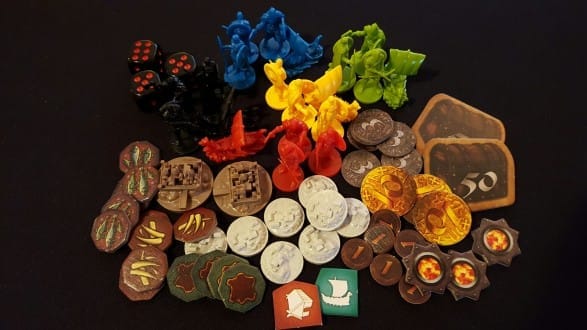
A note on “chrome”: The components in Fire & Axe are almost uniformly nice. The Vikinig miniatures come in three different sculpts, which is entirely unnecessary to gameplay but a really neat touch. Two of the player ships in the copy used for this review were broken in the box, but I was able to fix them easily enough. IDW has a reputation for great customer service for players who choose to ask for replacements rather than fix them themselves though. The only real complaint I have with the components is in the graphic design of the board. The colors are rather muted and it takes time to get familiar enough with the board to really see the distinction between the different sea areas, which is important to decision making while playing.
The bottom line:
Fire & Axe is a boat load (Heaven help me) of fun. Racing to complete Sagas and Raid towns, Trade goods and claim Settlements to snatch up points before your opponents can is fun, and will appeal to players who like competitive games that actually feel directly competitive. There are some Rune cards that can absolutely screw a player over, especially if they are ganged up on by a few of their opponents, but they are removed easily enough for players that don't enjoy that type of thing. The game plays well with different player counts, even just 2 players, and sets up quickly with a game length that is easily variable. It doesn't do anything revolutionary, but what it does do it does very well, from pick up and deliver, to dice combat to area control. The gameplay and mechanics are straightforward enough that Fire & Axe would be a great place to start for players new to hobby board gaming, yet it is still fun enough to engage players who are already well familiar with the hobby.
Get this game if:
You enjoy the Viking theme.
You like points-race games that are directly competitive, not simply multiplayer-solitaire.
You enjoy nautical themed adventure games like Merchants and Marauders.
Avoid this game if:
You prefer cooperative games.
You dislike competitive games that allow you do directly harm your opponents.
The copy of Fire & Axe used for this review was provided by IDW Games.
Review Summary
Fire & Axe takes straightforward mechanics and meshes them with a fun Viking theme. This is a great game, especially for people who like to directly interfere with their opponents.
(Review Policy)Have a tip, or want to point out something we missed? Leave a Comment or e-mail us at tips@techraptor.net
